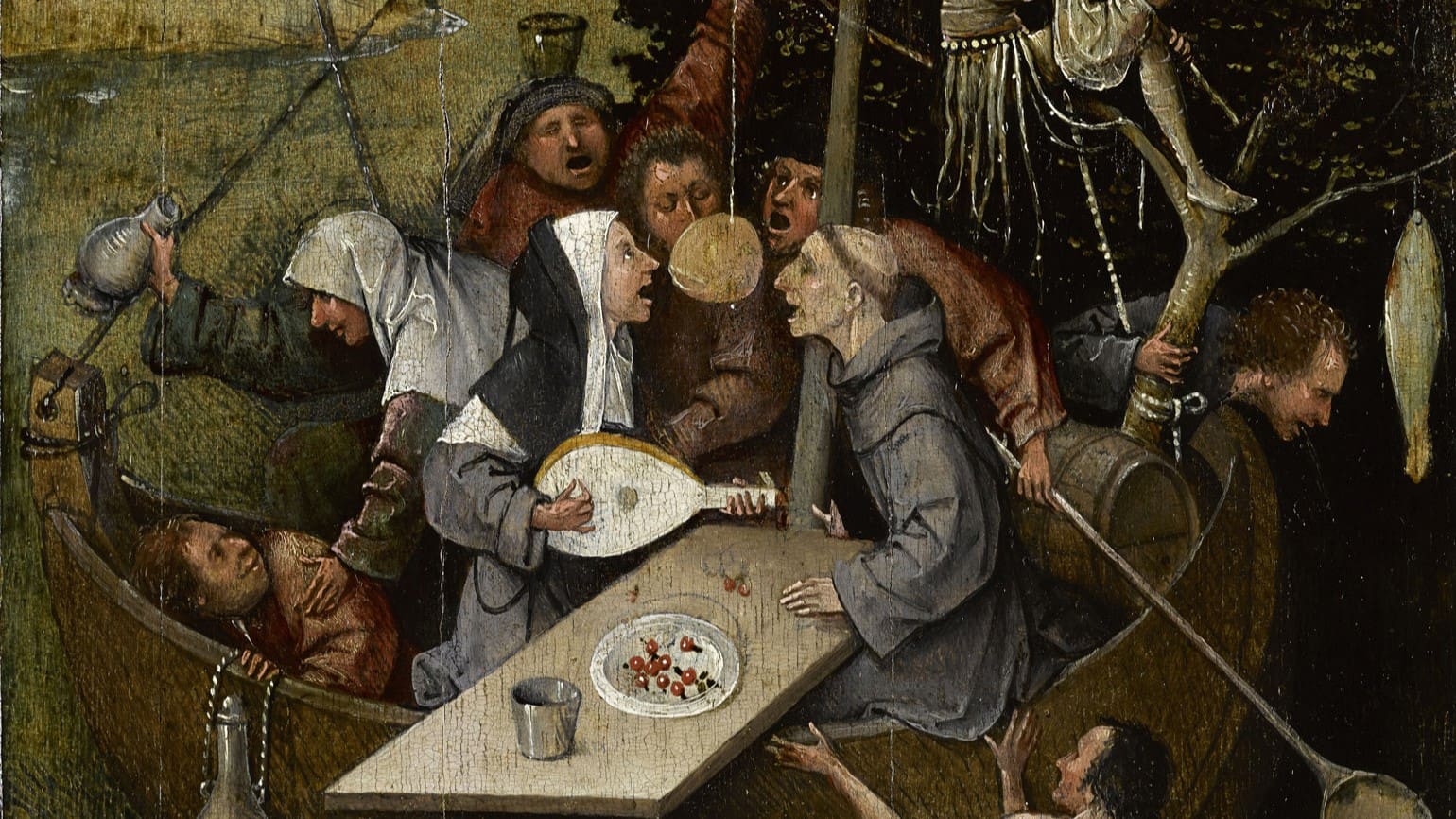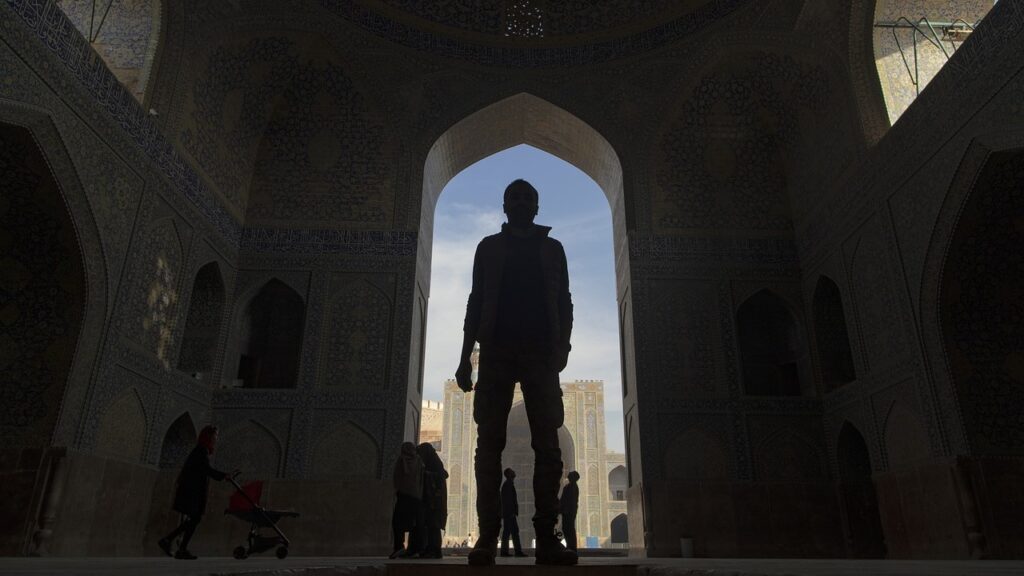The phrase ‘ship of fools’ is an old allegory, describing a dysfunctional system steered by incompetent leaders. We first encounter it in Plato’s Republic: drunken fools fight for the leadership, and anyone who won’t give them the helm is killed. ‘The sailors want to steer, although they know nothing of the art; and they have a theory that it cannot be learned. If the helm is refused them, they drug the captain’s posset, bind him hand and foot, and take possession of the ship. He who joins in the mutiny is termed a good pilot and what not; they have no conception that the true pilot must observe the winds and the stars, and must be their master, whether they like it or not; such an one would be called by them fool, prater, star-gazer.’ Later, this inspired Sebastian Brant’s 16th century German satirical poem where sailors seek a ‘fool’s paradise’, foolish, gullible and arrogant: at the end of their voyage they crown a pig. ‘One vessel would be far too small / To carry all the fools I know’, sighs the poet.[1] The allegory was also the subject of a painting by Hieronymus Bosch.
This is the allegory that may come to mind for the historian looking at Europe’s leaders in the spring of 2024. On 22 March, the Islamic State reared its head again, massacring 144 innocent people, including children, in Moscow. The Western and Northern parts of the continent, which have been engulfed in a war psychosis for more than two years now, should wake up to the fact that while we are busy refusing to negotiate peace and are marching towards a third world war, ‘our enemies will neither tire nor forget’. (This wise phrase was the motto of a Hungarian Catholic newspaper back in 1820).
There are forces that don’t care whether their victims follow Biden or Putin, are trans or non-trans, Christian, Jewish or (non-extremist) Muslim. They are united in wanting to see us all at the bottom of a mass grave—and they seem to be gaining strength again in perhaps not so far-flung corners of the world.
Our continent is effectively under siege—we can see that if we are willing to move away from the narratives that interpret migration solely as a ‘refugee issue’
and acknowledge that mass migration can also be a tool for terrorism and destabilization.
The number of irregular migrants arriving in the Canary Islands more than tripled in January this year compared to the previous year. Germany is overwhelmed. Reception capacity was already exceeded in 2023, when 330,000 asylum applications were submitted in just a year, mostly from Muslim countries. This is a 50 per cent increase compared to 2022. In addition, more than one million Ukrainian refugees have arrived in the country since the outbreak of the Russian–Ukrainian war. The levees are breaking and it seems that the tide will be unstoppable. What would the continent look like if the EU did not pay €6 billion to Türkiye and €7.4 billion to Egypt to keep migrants out? What happens if these countries are destabilized in another attempt to ‘export democracy’?
The result of the above is (and will be) an increased threat of terrorism. Both in France and Italy, the recent Easter holidays were celebrated with a high—and in the former case the highest—terrorist threat. It goes without saying, some people still deny that the European immigration problem has direct ties to real security issues.
In 2017, there were over 50,000 Salafists (radical Sunnis) in France; in 2022, 11,000 in Germany. Not all Salafists are jihadists, but many of them are or have such sympathies, and most European countries admit that extreme Salafists are a security concern. But they are not the only dangerous group in Europe. Although Germany banned Hezbollah in 2020, there remain about 1,250 members of the Shiite terror group. The constant surveillance of this many people regularly drains resources and manpower from the internal security services. In 2018, the German police were keeping only 774 radical Islamists under constant surveillance. A recent report from the Dutch National Coordinator for Counterterrorism and Security stated that ‘last year, the terrorist threat from ISIS to Europe increased. Especially since the second half of 2022 there have been ever more clues that ISIS is planning attacks in Europe.’ Israel has also warned that there are over 450 Hamas operatives in Germany alone.
Meanwhile, there are other ‘threats’ that some EU member states face.
An attempt was made recently to ban the NatCon conference in Brussels, to silence voices critical of migration and in favour of peace in Europe. So illegal migrants are allowed to arrive en masse, but the Belgian police have found their main opponents: conservative ladies and gentlemen in tweed jackets and a few Jews in yarmulkes who wanted to exchange ideas about preserving the continent as we know it. French President Emmanuel Macron, meanwhile, is threatening Russia with direct war with NATO—the same Macron who handed over his country’s strategic positions in Africa because he was unable to maintain a military presence there, and now cannot cope with the terrorist threat. ‘The sow alone now wears the crown’, the poet says.[2]
Perhaps the philosopher György Tatár was right in his article published on the Jewish news website Neokohn in March 2019: ‘The European and American cabins of the Ship of Fools are inhabited not by politically misguided people, but by the enemy.’
[1] Sebastian Brant, The Ship of Fools, translated into rhyming couplets with introductions and commentary by Edwin H. Zeydel, New York, Columbia University Press, 1944, p. 58.
[2] Ibid., p. 239.








